In 1893, Hubei provincial governor Zhang Zhidong laid the groundwork for an institution that, he believed, would accelerate the progress of the nation. Since no other educational institute existed in central China at the time, it became the first to open the doors to higher education for the youth of Hu Guang Province (which includes the present day Hunan and Hubei provinces). The idea he germinated for the institute was “self-strengthening”; in later years, all his successors chipped in to nurture and preserve the ideals of this elite university. Fast-forward to 2017, we find ourselves in this sprawling ultra-modern campus they would never have imagined. If governor Zhang Zhidong were around today, he would be blown away just by the magnificence of this university. The prestige and respect WHU commands today is beyond the fancy of its forefathers. In term of excellence, it is on par with any other world-class university.
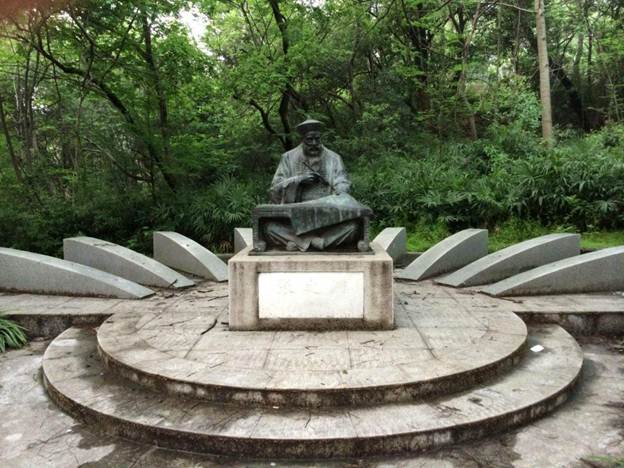
The statue of governor Zhang Zhidong in Wuhan University
In its shambolic political past,WHU has witnessed several momentous events----the Wuchang Uprising, the fall of the Qing Dynasty, Japanese aggression, and not to mention the June 1st Massacre in 1947. Throughout those dark time, WHU never let go of its core ethos and ideals, enlightening thousands of students in the following years. During its long engrossing history, WHU became the epitome of an ideal Chinese university and a torchbearer of the Chinese philosophy of self-improvement, perseverance and truth-seeking, which is now its guiding motto. Its renown grew phenomenally when it introduced several unorthodox reforms against the feudal society. In 1934, WHU first opened a swimming class for female college students, hence, putting an end to the misogynist mindset prohibiting female college students from swimming. With this, WHU sent out a very straightforward message—Discrimination against women should by no means become a convention to be tolerated.
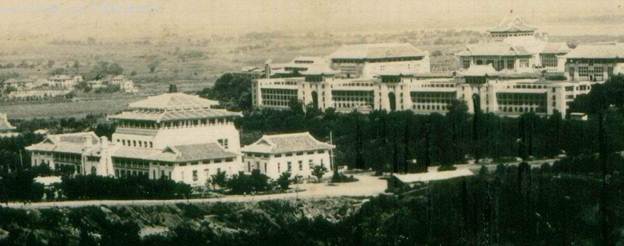
An old picture of the earliest buildings on campus
One of the many lesser known facts about WHU is that it played a pivotal role in ending the second Sino-Japanese war. In the aftermath of the Marco Polo Bridge Incident in 1937, Japanese troops occupied the important Chinese cities and Wuhan became the actual wartime capital before 1938. A large number of military force gathered in the campus premises and it became the staging ground for the resistance against Japan until Japan’s surrender in 1945.
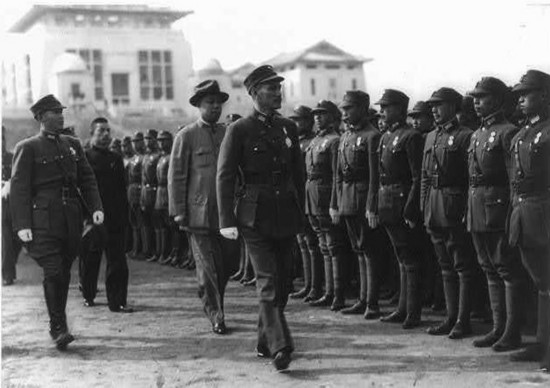
General in Chief Chiang Kai Shek reviewing his army in Wuhan University in 1938
WHU had experimented with several modest changes in the school’s management and curriculum. But, in 1981, during the tenure of President Liu Daoyu, he formulated a series of measures for the school’s teaching system, aimed at enhancing the school’s internationalization and cultural exchange. However, those reforms were considered radical and were later dismissed. Later in 1984, it became one of the first Chinese universities to establish a graduate school. After that, WHU unswervingly achieved one milestone after another to this day.
There is a running joke among WHUers about one incident in particular. In the year 1998, James Cameron’s epic film Titanic was screened at the Meiyuan amphitheater. Tickets were priced at 3 RMB per person and more than ten thousand tickets were sold out. Despite of the rain, many students sneaked in without tickets and the entire crowd of students watched the movie drenched in rain and holding back tears. Even today, movies are screened every weekend at the amphitheater but the crowd has never been bigger.
Some students regard WHU as the Yale of China. Even from a historical comparison perspective, WHU indeed shares a lot of similarities with Yale----both had feminist yet progressive undertows and had invested a great deal of resources to influence their nations’ progress in discerning ways. Like Yale, WHU has its own legion of successful alumni bankrolling sizeable amounts to their alma mater’s endowment fund. If Boeing, Fedex and Morgan Stanley are Yale’s masterstrokes, WHU has Xiaomi tech, Taikang Life and CCXI to take pride in. One distinction, however, is that WHU is a public university directly under the supervision of the Ministry of Education.
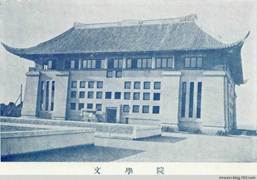
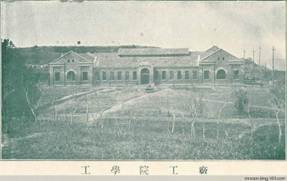
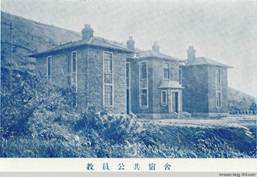
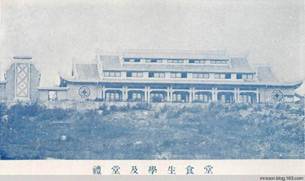
Teaching buildings, dormitories and canteen of WHU in 1940s
Other prized jewels of WHU are its well-preserved historical archives and beautiful architecture. Its palatial buildings were designed by the famed architects F. H. Kales and Shen Guoyao. Though they have undergone reconstructions several times, they still retain their original aesthetic appeal. This year marks 124 years since WHU came into being and it’s an emotionally charged moment for all of us as we look back and marvel at the many years of hard-won achievements. Around this time, the whole campus is dappled in verdant autumn hues, making it all the more hard for visitors to leave this place. To outsiders, it’s hard not to get caught up in wanderlust when they see the soul-stirring, postcard-perfect snapshots of the campus.

Autumn snapshot of the campus
WHU’s historical archives are a goldmine of edifying knowledge and an unfortunate reminder of the turbulent moments in WHU’s history which cannot be easily disposed of. However, on the flip side, these annals are widely shared by a great many students and, in a cascading effect, have resulted in them ruminating over the many untold local myths and fables from that time, reigniting conversations. One of the attributes of this university is its ability to endue its students with moral virtues and in spite of the wholesome transformations, its spirit has remained unabated.
Regard to the earliest institutes, WHU has been at the forefront contributing to China’s economic, political, scientific and educational development. WHU’s popularity has reached its zenith now and it has, by all odds, reinvented itself as an academic utopia. We have no inkling what WHU’s future holds but this responsibility, unarguably, rests on the shoulders of this generation of students and academicians.
Reference:
1. https://baike.baidu.com/item/%E6%AD%A6%E6%B1%89%E5%A4%A7%E5%AD%A6/106709?fr=aladdin&fromid=13980741&fromtitle=%E6%AD%A6%E5%A4%A7
2. http://daxue.163.com/15/0324/15/ALG0SOFH00913J5O.html
Photo from internet and whu.edu.com
Edited by Li Yunzhen, Wang Wei, Edmund Wai Man Lai & Hu Sijia